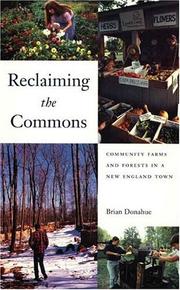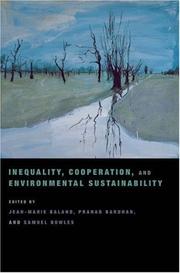| Listing 1 - 6 of 6 |
Sort by
|
Book
ISBN: 073917469X 0739174681 1299831338 9780739174692 9781299831339 9780739174685 9780739185407 0739185403 Year: 2013 Publisher: Lanham, Maryland : Lexington Books,
Abstract | Keywords | Export | Availability | Bookmark
 Loading...
Loading...Choose an application
- Reference Manager
- EndNote
- RefWorks (Direct export to RefWorks)
Removing the Commons defends a Lockean Left-Libertarian account of the moral conditions in which people may remove, either via use or appropriation, natural resources from the commons. I conclude that self-owning agents may remove natural resources from the commons just so long as they leave others the competitive value of their removal in a way that best affords others an equal opportunity for welfare.
Commons. --- Natural resources, Communal. --- Right of property. --- Ownership of property --- Private ownership of property, Right of --- Private property, Right of --- Property, Right of --- Property rights --- Right of private ownership of property --- Right of private property --- Right of property --- Right to property --- Communal natural resources --- Community-owned natural resources --- Common lands --- Commons --- Communal land --- Communal lands --- Law and legislation --- Civil rights --- Property --- Collective settlements --- Public lands --- Village communities --- Land tenure --- Real property --- Marks (Medieval land tenure) --- Natural resources, Communal --- E-books
Book
ISBN: 0745333702 0745333710 1849649251 1849649243 9781849649247 Year: 2013 Publisher: London : Pluto Press,
Abstract | Keywords | Export | Availability | Bookmark
 Loading...
Loading...Choose an application
- Reference Manager
- EndNote
- RefWorks (Direct export to RefWorks)
Uncovering the rich heritage of common ownership which existed before the dominance of capitalist property relations, Giovanna Ricoveri argues that the subsistence commons of the past can be reinvented today to provide an alternative to the current destructive economic order. Ricoveri outlines the distinct features of common ownership as it has existed in history through cooperatives, sustainable use of natural resources and direct democracy. In doing so, she shows how it is possible to provide goods and services which are not commodities exchanged on the capitalistic market, something still demonstrated today in village communities across the global South. Tracing the erosion of the commons from the European enclosures at the dawn of the Industrial Revolution to the new enclosures of modern capitalism, the book concludes by arguing that a new commons is needed today. It will be essential reading for activists as well as students and academics in history, politics, economics and development studies.
Commons. --- Natural resources, Communal. --- Sustainable development. --- Capitalism. --- Market economy --- Economics --- Profit --- Capital --- Development, Sustainable --- Ecologically sustainable development --- Economic development, Sustainable --- Economic sustainability --- ESD (Ecologically sustainable development) --- Smart growth --- Sustainable development --- Sustainable economic development --- Economic development --- Communal natural resources --- Community-owned natural resources --- Collective settlements --- Commons --- Public lands --- Village communities --- Common lands --- Communal land --- Communal lands --- Land tenure --- Real property --- Marks (Medieval land tenure) --- Natural resources, Communal --- Environmental aspects --- Law and legislation --- Capitalism --- E-books --- Political Science --- Public Policy --- Environmental Policy

ISBN: 0300076738 0585337411 9780585337418 Year: 1999 Publisher: [Place of publication not identified] Yale University Press
Abstract | Keywords | Export | Availability | Bookmark
 Loading...
Loading...Choose an application
- Reference Manager
- EndNote
- RefWorks (Direct export to RefWorks)
Collective farms --- Commons --- Community forests --- Land use, Rural --- Geografie --- Environmental aspects --- Landschapskunde --- Historische geografie --- Groot-Brittanië. --- Real Estate, Housing & Land Use --- Business & Economics --- Rural land use --- Land use --- Agriculture --- Communal forests --- Community-managed forests --- Forest commons --- Forests and forestry, Cooperative --- Natural resources, Communal --- Agriculture, Cooperative --- Collective settlements --- Collectivization of agriculture --- Communism and agriculture --- State farms --- Common lands --- Communal land --- Communal lands --- Land tenure --- Public lands --- Real property --- Marks (Medieval land tenure) --- Village communities --- Law and legislation --- E-books
Book
ISBN: 9782952018043 Year: 2008 Publisher: Valence Repas
Abstract | Keywords | Export | Availability | Bookmark
 Loading...
Loading...Choose an application
- Reference Manager
- EndNote
- RefWorks (Direct export to RefWorks)
Collective settlements --- Utopian socialism --- Visionary architecture --- Industrial sociology --- Communautés --- Socialisme utopique --- Architecture visionnaire --- Sociologie industrielle --- History --- Histoire --- Godin, Jean Baptiste André, --- Société du Familistère de Guise --- Godin, Jean-Baptiste André, --- Familistère de Guise --- --Économie sociale --- --Utopian socialism --- Utopias --- Godin, Jean Baptiste André, --- Société du Familistère de Guise --- FR / France - Frankrijk --- 330.08 --- 330.55 --- Economisten. --- Coöperatief stelsel. --- Communautés --- Ideal states --- States, Ideal --- Utopian literature --- Political science --- Socialism --- Voyages, Imaginary --- Dystopias --- Socialism, Utopian --- Economisten --- Coöperatief stelsel --- Godin, André, --- Godin, J.-B. A. --- Familistère de Guise --- History.

ISBN: 0691128790 9780691128795 Year: 2007 Publisher: New York Russell Sage Foundation
Abstract | Keywords | Export | Availability | Bookmark
 Loading...
Loading...Choose an application
- Reference Manager
- EndNote
- RefWorks (Direct export to RefWorks)
Would improving the economic, social, and political condition of the world's disadvantaged people slow--or accelerate--environmental degradation? In Inequality, Cooperation, and Environmental Sustainability, leading social scientists provide answers to this difficult question, using new research on the impact of inequality on environmental sustainability.The contributors' findings suggest that inequality may exacerbate environmental problems by making it more difficult for individuals, groups, and nations to cooperate in the design and enforcement of measures to protect natural assets ranging from local commons to the global climate. But a more equal division of a given amount of income could speed the process of environmental degradation--for example, if the poor value the preservation of the environment less than the rich do, or if the consumption patterns of the poor entail proportionally greater environmental degradation than that of the rich. The contributors also find that the effect of inequality on cooperation and environmental sustainability depends critically on the economic and political institutions governing how people interact, and the technical nature of the environmental asset in question. The contributors focus on the local commons because many of the world's poorest depend on them for their livelihoods, and recent research has made great strides in showing how private incentives, group governance, and government policies might combine to protect these resources.
Sustainable development --- Natural resources, Communal --- Commons --- AA / International- internationaal --- 339.21 --- 351.2 --- 355 --- Ongelijkheid en herverdeling van vermogens en inkomens. Inkomensbeleid. --- Openbare gezondheid. Milieubescherming. Milieuvervuiling. --- Milieu --- Social Sciences and Humanities. Economics --- Environmental Economics --- Environmental Economics. --- Common lands --- Communal land --- Communal lands --- Land tenure --- Public lands --- Real property --- Marks (Medieval land tenure) --- Village communities --- Communal natural resources --- Community-owned natural resources --- Collective settlements --- Ongelijkheid en herverdeling van vermogens en inkomens. Inkomensbeleid --- Openbare gezondheid. Milieubescherming. Milieuvervuiling --- Law and legislation --- Case studies. --- Sustainable development - Case studies --- Natural resources, Communal - Case studies --- Commons - Case studies
Book
ISBN: 9786155225512 9786155225512 9786155225147 6155225516 6155225141 Year: 2013 Publisher: Budapest ; New York : Central European University Press,
Abstract | Keywords | Export | Availability | Bookmark
 Loading...
Loading...Choose an application
- Reference Manager
- EndNote
- RefWorks (Direct export to RefWorks)
Before collectivization of agriculture in Estonia, “kulaks” (better-off farmers) were persecuted and many of them were finally deported in March 1949. This book is situated on the local level; the aim is to understand what these processes meant from the perspective of the Estonian rural population, a kind of study that has been missing so far. Analyzes the mechanisms of repression, applying new aspects. Repression was mainly conducted through a bureaucratic process where individual denunciations were not even necessary. The main tool of persecution was a screening of the rural population with the help of records, censuses and local knowledge, in order to identify, or invent, “kulak families”. Moreover, in the Estonian sources, the World War II history of each individual was a crucial part of screenings. The prisoners of war of the Red Army, held in camps in Estonia, played an unexpected part in this campaign. Another result is a so far neglected wave of peaceful resistance as the kulak identifications were challenged in 1947-48. This has not been addressed in the existing literature. The results mainly answer the question “how” this process worked, whereas the question ”why” finds hypothetical responses in the life trajectories of actors.
Collectivization of agriculture --- State-sponsored terrorism --- Communism --- Peasants --- Collective farms --- Land tenure --- History. --- History --- Estonia --- Rural conditions --- Agrarian tenure --- Feudal tenure --- Freehold --- Land ownership --- Land question --- Landownership --- Tenure of land --- Peasantry --- Bolshevism --- Communist movements --- Leninism --- Maoism --- Marxism --- Trotskyism --- Government violence --- Governmental violence --- State-sponsored violence --- State terrorism --- Violence, Governmental --- Violence, State-sponsored --- Agricultural collectivization --- Collective farming --- Collectivisation of agriculture --- Ėstonskai︠a︡ SSR --- Ėstonskai︠a︡ S.S.R. --- Estonskaya Sovetskaya Sot︠s︡ialisticheskaya Respublika --- Ėstonskai︠a︡ Sovetskaia Sot︠s︡ialisticheskaia Respublika --- Estonian Soviet Socialist Republic --- Estonskaya SSR --- Estonskaya S.S.R. --- Estonian SSR --- Estonian S.S.R. --- Eesti Nõukogude Sotsialistik Vabariik --- ENSV --- E.N.S.V. --- Eesti --- Ėstonii︠a︡ --- Eesti Vabariik --- Esthonia --- Estland --- Eesti NSV --- Republic of Estonia --- Ehstland --- Esthland --- R.P.S.S. Estonia --- RPSS Estonia --- Estonija --- Land use, Rural --- Real property --- Land, Nationalization of --- Landowners --- Serfdom --- Agriculture, Cooperative --- Collective settlements --- Communism and agriculture --- State farms --- Agricultural laborers --- Rural population --- Marks (Medieval land tenure) --- Villeinage --- Collectivism --- Totalitarianism --- Post-communism --- Socialism --- Village communities --- Political atrocities --- Terrorism --- Agriculture and state --- Ostland --- Ėstli︠a︡ndskai︠a︡ gubernīi︠a︡ (Russia) --- E-books --- Viro --- Эстония --- Collectivization, Agriculture, Communism, Estonia, Prisoners of war, Rural conditions, Soviet Union. --- Collectivization of agriculture-Estonia-History. --- Collectivization of agriculture-Soviet Union-History. --- State-sponsored terrorism-Estonia-History. --- Communism-Estonia-History-20th century. --- Peasants-Estonia-History-20th century. --- Collective farms-Estonia-History. --- Land tenure-Estonia-History. --- Estonia-Rural conditions-20th century. --- Estonia-History-1940-1991.
| Listing 1 - 6 of 6 |
Sort by
|

 Search
Search Feedback
Feedback About
About Help
Help News
News